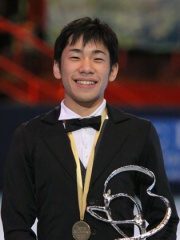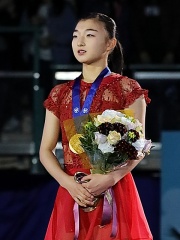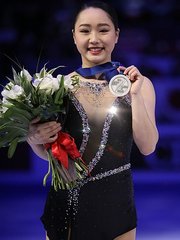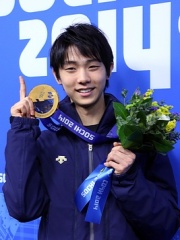
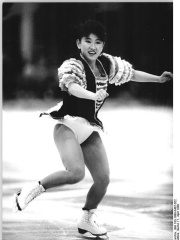
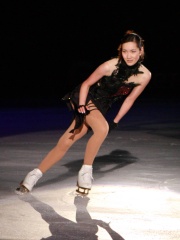

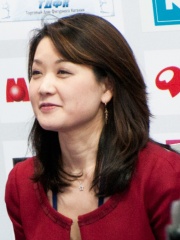
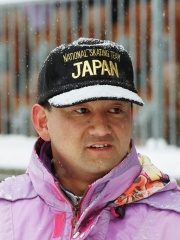
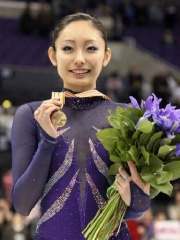
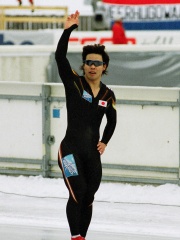
The Most Famous
SKATERS from Japan
Top 10
The following people are considered by Pantheon to be the top 10 most legendary Japanese Skaters of all time. This list of famous Japanese Skaters is sorted by HPI (Historical Popularity Index), a metric that aggregates information on a biography's online popularity. Visit the rankings page to view the entire list of Japanese Skaters.

1. Yuzuru Hanyu (b. 1994)
With an HPI of 53.47, Yuzuru Hanyu is the most famous Japanese Skater. His biography has been translated into 40 different languages on wikipedia.
Yuzuru Hanyu (羽生 結弦, Hanyū Yuzuru; Hiragana: はにゅう ゆづる; born December 7, 1994) is a Japanese figure skater and ice show producer. Universally regarded as one of the greatest figure skaters in history for his well-rounded skills, achievements, innovations, longevity, popularity, and impact on the sport, he started skating at four years old and competed in the men's singles discipline from 2004 to 2022. Hanyu is the first men's single skater in 66 years since Dick Button to win back-to-back Olympic titles (2014, 2018), and the only Asian Olympic champion in that discipline. He is a two-time World champion (2014, 2017), six-time Japanese national champion (2012–2015, 2020–2021), and the first singles skater to win four consecutive Grand Prix Finals (2013–2016). With his win at the 2020 Four Continents Championships, he became the first skater in men's singles to complete the Super Slam, having won all major international junior and senior titles in the course of his career. He is also the only single skater to be ranked first in the ISU World Standings for five consecutive seasons (2014–2018). Hanyu broke world records 19 times, the most in singles since the introduction of the ISU Judging System in 2003, and was the first skater to land a quadruple loop jump in international competition among other achievements. According to Nikkei Asia, Hanyu's move to professional level in 2022 marked the "end of an era" in competitive figure skating. His first major work as a professional is the ongoing Yuzuru Hanyu Ice Story series, with its prelude event Prologue (2022) being the first solo ice show and the Repray Tour (2023–24) the first solo tour production in figure skating. His second solo show Gift (2023) was the first ice skating event to be held at Tokyo Dome, breaking the record for the largest ice show audience with 35,000 people. Hanyu's Ice Story series, which has attracted more than 100,000 spectators in total by February 2024, opened a new genre of performing art and entertainment, weaving live skating performances into comprehensive, philosophical stories with elaborate on-screen narration. At 16 years old, Hanyu experienced the 2011 Tōhoku earthquake and tsunami in his hometown of Sendai, which fundamentally shaped his life and career, having participated in different charity events and dedicated various performances to the victims of the disaster. He is also the chairperson of Nippon TV's annual 3.11 commemoration ice show Yuzuru Hanyu Notte Stellata, inaugurated in 2023. Since the earthquake, Hanyu has donated a cumulative total of more than $3 million USD for reconstruction, disaster prevention, and other humanitarian efforts. The donations include the full prize money of his Olympic wins and all royalties from his best-selling autobiography series Blue Flames I–IV. In recognition of his achievements, Hanyu became the youngest recipient of the People's Honor Award (2018), bestowed by the Prime Minister of Japan, received Japan's Medal of Honor with purple ribbon twice (2014, 2018) and was awarded the Kikuchi Kan Prize (2022). He is the first figure skater to be nominated for the Laureus World Sports Award (2019) and was named the Most Valuable Skater at the inaugural ISU Skating Awards (2020). He was also featured in prestigious lists, such as Forbes' 30 Under 30 Asia (2018), ESPN's top 25 of greatest Olympians of the 21st century (#10), and the International Sports Press Association's list of most impactful male athletes of the last 100 years (#6) (both 2024). In 2022, he was ranked sixth in the list of most-searched athletes on Google Search worldwide.

2. Midori Ito (b. 1969)
With an HPI of 53.12, Midori Ito is the 2nd most famous Japanese Skater. Her biography has been translated into 23 different languages.
Midori Ito (伊藤みどり, Itō Midori; born 13 August 1969) is a retired Japanese figure skater. She is the 1989 World champion and the 1992 Olympic silver medalist. She is the first woman to land a triple Axel in competition. At the 1988 Calgary Olympics, she became the first woman to land seven triple jumps in an Olympic free skating competition. She is widely recognised as one of the best figure skaters of all time.

3. Shizuka Arakawa (b. 1981)
With an HPI of 47.22, Shizuka Arakawa is the 3rd most famous Japanese Skater. Her biography has been translated into 35 different languages.
Shizuka Arakawa (荒川 静香, Arakawa Shizuka; born December 29, 1981) is a retired Japanese figure skater. She is the 2006 Olympic champion and the 2004 World champion. Arakawa is the first Japanese skater to win an Olympic gold medal in figure skating and the second Japanese skater to win any Olympic medal in figure skating, after Midori Ito, who won silver in 1992. She is also the second Japanese woman to win a gold medal at the Winter Olympics, following skier Tae Satoya. She was the only Japanese medalist at the 2006 Winter Olympics. Arakawa retired from competitive skating following her Olympic win and began skating professionally in ice shows and exhibitions. She also works as a skating sportscaster for Japanese television.

4. Mao Asada (b. 1990)
With an HPI of 46.49, Mao Asada is the 4th most famous Japanese Skater. Her biography has been translated into 35 different languages.
Mao Asada (浅田 真央, Asada Mao; born 25 September 1990) is a Japanese former competitive figure skater. She is the 2010 Olympic silver medalist, a three-time World champion (2008, 2010, 2014), a three-time Four Continents champion (2008, 2010, 2013), and a four-time Grand Prix Final champion (2005–06, 2008–09, 2012–13, 2013–14). She is the first female figure skater who has landed three triple Axel jumps in one competition, which she achieved at the 2010 Winter Olympics. Asada is also the 2005 World Junior champion, the 2004–05 Junior Grand Prix Final champion, and a six-time Japanese national champion (2006–2009, 2011–2012). She is the former world record holder for the ladies' short program score, which she set at the 2014 World Championships and held until it was broken by Evgenia Medvedeva in 2016. A former prodigy, Asada is the fifth woman and the first junior girl to land the triple Axel, accomplishing this at the 2004–05 Junior Grand Prix Final. She won her first Grand Prix Final at the age of 15. Considered by many to be the best figure skater in the world at that time, Asada was 87 days too young to compete at the 2006 Winter Olympics. She is the first figure skater in a singles discipline from Asia to win multiple world championships. At the 2013 Skate America, she became the first singles skater, male or female, to win all seven of the current events on the Grand Prix series. She holds 15 Grand Prix series titles, the second-highest total among ladies and the sixth-highest total among skaters of all four disciplines. Due to her collection of ISU titles surpassing any other ladies singles figure skater during her time, she has established herself as one of the most highly recognized athletes in Japan and is widely considered to be among the best ladies figure skaters of all time. She is credited with being one of the pioneering ladies skaters that truly combined athleticism and artistry. Notable athletes including Yuzuru Hanyu and Shoma Uno regard Asada as their role model.
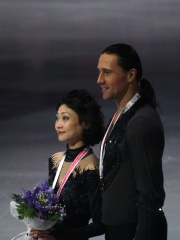
5. Yuko Kavaguti (b. 1981)
With an HPI of 45.80, Yuko Kavaguti is the 5th most famous Japanese Skater. Her biography has been translated into 19 different languages.
Yuko Kavaguti (also: Kawaguchi; Japanese: Kawaguchi Yūko (川口 悠子), Russian: Юко Кавагути, born 20 November 1981) is a retired pair skater who represented Japan and Russia in international competition. In 2006, she began competing with Alexander Smirnov for Russia. They are two-time European champions (2010, 2015), two-time World bronze medalists (2009, 2010), two-time ISU Grand Prix Final bronze medalists (11–12 and 15–16), and three-time Russian national champions (2008–2010). In 2015, they became the first pair in history to complete two quadruple throw jumps in one program and the first to land a quadruple throw loop.

6. Yuka Sato (b. 1973)
With an HPI of 45.08, Yuka Sato is the 6th most famous Japanese Skater. Her biography has been translated into 15 different languages.
Yuka Sato (佐藤 有香, Satō Yuka; born February 14, 1973) is a Japanese former competitive figure skater and choreographer. She is the 1994 World champion, the 1990 World Junior champion and the 1993 & 1994 Japanese national champion. She placed 7th at the 1992 Winter Olympics and 5th at the 1994 Winter Olympics.

7. Akira Kuroiwa (b. 1961)
With an HPI of 44.93, Akira Kuroiwa is the 7th most famous Japanese Skater. His biography has been translated into 19 different languages.
Akira Kuroiwa (黒岩 彰, Kuroiwa Akira; born 6 September 1961) is a former speed skater from Japan, who represented his native country at two consecutive Winter Olympics, starting in 1984 in Sarajevo, Yugoslavia. In 1988, he won the bronze medal in the men's 500 metres, after having captured two world titles at the Sprints Championships (1983 and 1987). At the 1984 Winter Olympics, Kuroiwa finished 10th in the men's 500 m. Kuroiwa, who was born in Tsumagoi, Gunma, was a coach for the Japanese team during the 1998 Winter Olympics. In Japan, Kuroiwa made headlines in 2000 when he tried to shield Daisuke Matsuzaka from an illegal driving charge by taking the blame for himself.

8. Miki Ando (b. 1987)
With an HPI of 43.84, Miki Ando is the 8th most famous Japanese Skater. Her biography has been translated into 25 different languages.
Miki Ando (安藤 美姫, Andō Miki; born December 18, 1987) is a retired Japanese figure skater. She is the 2007 and 2011 World champion, 2011 Four Continents champion, 2004 World Junior champion, and a three-time (2003, 2004 & 2010) Japanese national champion. Ando is the first female skater to complete a quadruple jump successfully in competition. She accomplished this at the 2002–03 Junior Grand Prix Final in The Hague, Netherlands.

9. Hiroyasu Shimizu (b. 1974)
With an HPI of 43.66, Hiroyasu Shimizu is the 9th most famous Japanese Skater. His biography has been translated into 20 different languages.
Hiroyasu Shimizu (清水 宏保, Shimizu Hiroyasu; born 27 February 1974) is a Japanese speed skater. He has an Olympic gold medal from 1998 in the 500 m, and held the 500 m record (34.32). He was married to Japanese fashion model Reiko Takagaki.

10. Yoshihiro Kitazawa (b. 1962)
With an HPI of 43.01, Yoshihiro Kitazawa is the 10th most famous Japanese Skater. His biography has been translated into 15 different languages.
Yoshihiro Kitazawa (北沢 欣浩, Kitazawa Yoshihiro; born 4 August 1962) is a Japanese speed skater who competed in the 1984 Winter Olympics. He was born in Kushiro, Hokkaidō. In 1984 he won the silver medal in the 500 metres event. In the 1000 metres competition he finished 31st.
People
Pantheon has 35 people classified as Japanese skaters born between 1961 and 2003. Of these 35, 35 (100.00%) of them are still alive today. The most famous living Japanese skaters include Yuzuru Hanyu, Midori Ito, and Shizuka Arakawa. As of April 2024, 5 new Japanese skaters have been added to Pantheon including Yoshihiro Kitazawa, Hiromi Yamamoto, and Toshiyuki Kuroiwa.
Living Japanese Skaters
Go to all RankingsYuzuru Hanyu
1994 - Present
HPI: 53.47
Midori Ito
1969 - Present
HPI: 53.12
Shizuka Arakawa
1981 - Present
HPI: 47.22
Mao Asada
1990 - Present
HPI: 46.49
Yuko Kavaguti
1981 - Present
HPI: 45.80
Yuka Sato
1973 - Present
HPI: 45.08
Akira Kuroiwa
1961 - Present
HPI: 44.93
Miki Ando
1987 - Present
HPI: 43.84
Hiroyasu Shimizu
1974 - Present
HPI: 43.66
Yoshihiro Kitazawa
1962 - Present
HPI: 43.01
Nobunari Oda
1987 - Present
HPI: 42.55
Kaori Sakamoto
2000 - Present
HPI: 42.50
Newly Added Japanese Skaters (2025)
Go to all RankingsYoshihiro Kitazawa
1962 - Present
HPI: 43.01
Hiromi Yamamoto
1970 - Present
HPI: 40.93
Toshiyuki Kuroiwa
1969 - Present
HPI: 39.31
Wakaba Higuchi
2001 - Present
HPI: 35.45
Takafumi Nishitani
1979 - Present
HPI: 35.21

